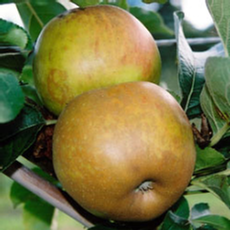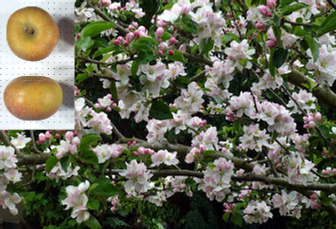

26. Ashmead’s Kernel 2 - Dessert Apple

Season : Pretty pink blossom in May (relatively late), and harvesting from October -
Pollination: Ashmead’s Kernal is Self Sterile, and ‘triploid’ -
Rootstock: MM106 is used to improve the vigour of this tree -
Notes

Description: Small to medium in size, the apples are pale green with heavy russeting and a reddish flush that develops as the fruits ripen.
In shape, the fruits are a flattened round, and my be a bit lopsided.
They have a have a unique acid ‘pear drop’ flavour and excellent keeping qualities.
The flavour develops on keeping.
The flesh is crisp and juicy, white, but browning easily when exposed.
Ashmeads Kernel is a very old traditional English russet apple. Despite not being the easiest of trees, it remains popular for its distinctive pear-
Although often considered as a connoisseur's dessert apple, Ashmead's Kernel is actually quite versatile. It can be used for cooking, or sliced in savoury salads, and it keeps very well in a cold store.
This apple is also becoming increasingly recognised for its juice, which adds an interesting fruity component to cider blends.
Ashmead's Kernel is often reported as having been raised by Dr Ashmead in Gloucester, England in the 18th century. However Christine Leighton of the Gloucestershire Orchard Group suggests that the originator may have been William Ashmead, a lawyer who died in 1782.
We have two of these trees, the other is at number 15.

Malus domestica 'Ashmead's Kernel'
A dull-
and particularly attractive blossom